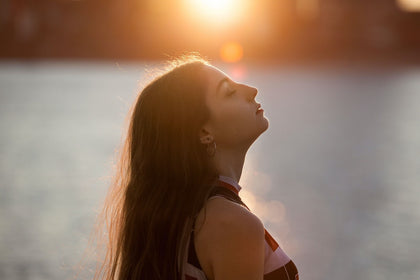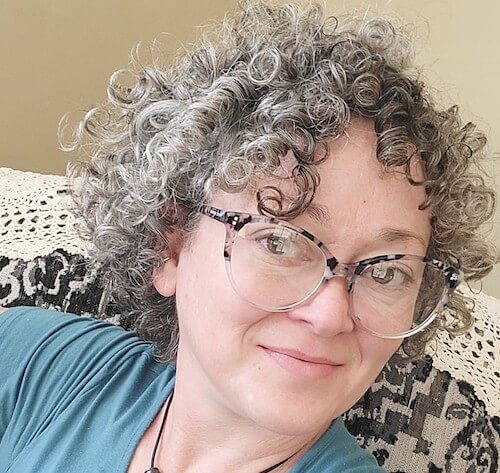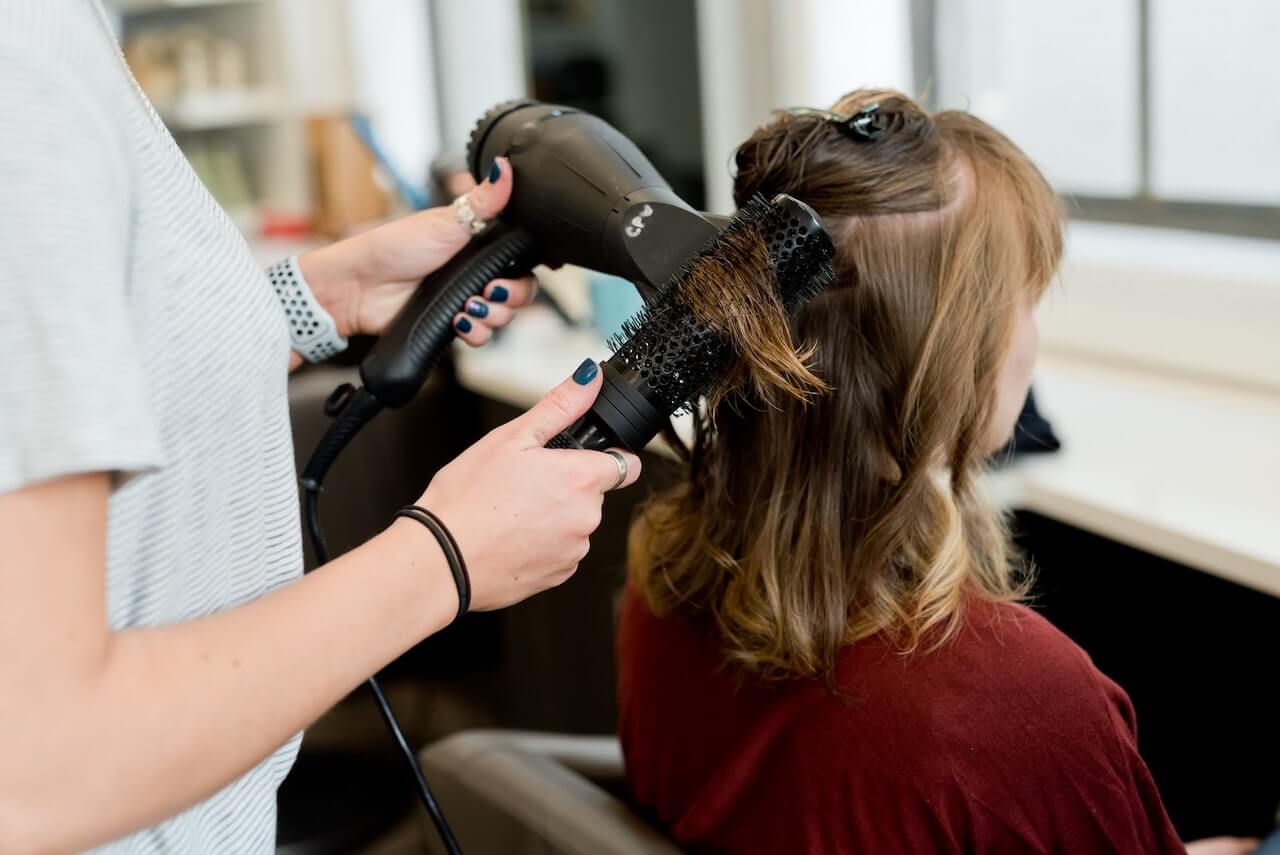Well-meaning friends and family members may advise you to get more sun when they hear you lamenting about your slow-growing or thinning hair. But does sun exposure really help? Or is it more about the vitamin D from the sun's rays?
Read on to find out whether the sun makes your hair grow — plus, what products you should really be using to reach your hair goals.
The Sun and Hair Health
It's true that those summer days in the sun can stimulate hair growth. When your skin is exposed to sunlight, UVB rays of the sun convert inactive 7-dehydrocholesterol to cholecalciferol, which then is converted to dihydroxycholecalciferol (Vitamin D3) in the liver and kidneys. In this way, sunlight helps our bodies to produce critical vitamin D, often called the "sunshine vitamin," which can be beneficial to your body and mood — and promote hair growth.
Here are some facts about vitamin D:
- Your body produces its own vitamin D after sufficient sun exposure.
- Vitamin D helps your body to absorb the calcium it needs for strong bones.
- Vitamin D helps regulate the immune system.
- Vitamin D deficiency can cause disruptions in mood, increase the likelihood of certain diseases and also contribute to hair loss or thinning.
- Vitamin D3, particularly, plays a role in the healthy growth of hair follicles.
The Role of Vitamin D In Hair Growth
VEGAMOUR spoke with Erum N. Ilyas, MD and board-certified dermatologist with AmberNoon & Montgomery Dermatology, about the connection between vitamin D and hair growth.
Ilyas said, "Although there are not a lot of studies evaluating the ability of vitamin D supplementation to improve hair growth ... studies have demonstrated that those with stress-induced hair loss (Telogen effluvium), trichotillomania (hair-pulling disorder), androgenetic alopecia (patterned baldness or hair loss) and alopecia areata have been noted to have lower vitamin D levels. This suggests a potential role for vitamin D ... in managing these types of hair loss."
While supplementation can help with a vitamin D deficiency, (which should be diagnosed by a medical doctor), there are many other reasons for hair loss, such as stress, lack of sleep, other vitamin deficiencies not limited to vitamin D, increased DHT and miRNA22 levels and poor circulation or scalp health. Although some sources suggest that vitamin D3 deficiency is the most frequent cause, hair loss is often attributed to a combination of these other factors.
If you're interested in supplementing vitamin D3, consider taking a daily biotin gummy,which contains 50% of the daily value of vitamin D3, plus a host of other hair-healthy vitamins and minerals to encourage fuller-looking, shinier hair. All it takes is just one fruity gummy per day!
Shop: GRO Revitalizing Scalp Massager
Sun Exposure vs. Risk
While spending the summer lounging in the sun sounds like great fun, those delicate hair follicles need a lot more than a day by the pool. Additionally, it's important to understand that exposure to the sun does create risk, especially to the skin and hair. UV radiation in sunlight can cause harm to your hair and health in several ways:
- Hair shafts can lighten in color and become brittle.
- Excessive sun exposure can burn the skin of the scalp.
- UV exposure is linked to skin cancer and other skin disorders.
- UV rays have mutating effects on cell DNA, which can cause oxidating sun damage, altering the amino acids on hair shaft proteins such as cysteine, tyrosine, histidine and tryptophan.
- UV rays can degrade moisture lipids in the hair shaft.
- UV rays can also break down the melanin pigments in hair, which help to protect the skin of the scalp from excessive sunlight exposure.
- Sunlight can exacerbate some skin conditions such as acne and fungal infections of the scalp.
Celebrity stylist Ashley Streicher states: "I would say be aware of the sun and your scalp and hair, be sure to cover your head with a hat and not overexpose to sun and salt as this could dry and damage your hair without you even knowing it. Also if youre wearing your hair up a lot, be aware of tight pony tails that can pull and kink your hair, go for looser braids and soft scrunchies."
Healthier Ways to Promote Fuller, Thicker Hair
Your doctor can help you weigh the risks of sunlight exposure or recommend another form of treatment such as vitamin D supplements or non-ionizing light therapy. But there's also something easier you can do right now: Provide a more well-rounded haircare plan that targets more than one of the causes of thinning hair. Here are some suggestions.
Replace Your Shampoo and Conditioner
Many shampoos and conditioners that claim to promote hair growth contain harsh chemicals or toxins. Not so with our GRO Revitalizing Shampoo and Conditoner. Both formulas provide powerful phyto-actives and Karmatin™️, our proprietary microencapsulated vegan b-SILK™ protein, to promote visibly thicker, fuller and longer-looking hair that's silky soft and luxurious to the touch.
Provide Nutrients at the Scalp
VEGAMOUR founder Dan Hodgdon states: "Hair growth products are those that help promote & support a healthy hair growth cycle," also consider GRO Hair Serum, which is full of vegan phyto-actives that have been clinically proven to promote thicker, fuller-looking hair. Apply this non-greasy serum directly to your scalp daily to increase hair density and decrease shedding in as little as four months.
Provide Nutrients from Within
Eating a healthy diet is beneficial to your scalp and hair health, but there's also a place for supplementation. Besides taking a biotin gummies, you can further support your hair while keeping your gut well-balanced with GRO Well Hair Boost Supplement Powder + Probiotics drink mix with vital vegan nutrients and no added sugars. The convenient stick packs, which you can add to water or your favorite smoothie, come in delicious flavors like Peach Mango, Cacao and Mixed Berry.
Take a Holistic Approach to Hair Wellness
When you do spend time outdoors, remember to protect your hair to prevent hair damage from the sun's UV rays. You can wear a hat or scarf to protect the hair and apply sunscreen to your skin for protection from sun damage.
But a healthy head of hair is far better supported by a whole-body approach that puts your health and wellness at the center — rather than risk exposing your skin to too much UV from the sun. Eat a nutritious diet, get plenty of sleep, stay hydrated, exercise, reduce stress and switch out your hair care products for healthier, natural alternatives that are designed to promote and stabilize a healthy scalp ecosystem.
#include-related-slider#
More From VEGAMOUR
- 4 Tips for Healthy Hair Growth
- How Long Does It Take for Hair to Grow Back?
- How to Add More Volume to Your Hair
- What Causes Sudden Hair Loss?
Photo credit: Adrià García Sarceda/Unsplash
Back



















